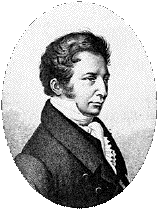December 6: Joseph Louis Gay-Lussac
Joseph Louis Gay-Lussac (1778)
It was on this date, December 6, 1778, that French chemist Joseph Louis Gay-Lussac was born in Saint-Léonard-de-Noblat. He studied at the École Polytechnique, then at the École des Ponts et Chausses, and apprenticed under the famous chemist Claude Louis Berthollet. Gay-Lussac returned to the École Polytechnique to became professor of chemistry, and was professor of physics at the Sorbonne from 1808 to 1832.
It was the Age of Revolution in France, following the successful one across the ocean, and also an era that revolutionized chemistry. Gay-Lussac formulated the law that a gas expands linearly with a fixed pressure and rising temperature. He did this in 1802, but the discovery later became known as Charles's Law, after Jacques Charles, whose unpublished discovery is thus acknowledged. He also first isolated the element boron, showed chlorine to be an element, and formulated the law of combining volumes of gasses.
During the Revolution of 1830, Gay-Lussac worked politically with the anti-clerical side, and was closely associated with mathematician and astronomer Dominique François Jean Arago, an outspoken atheist and republican, as well as German naturalist Alexander von Humboldt, a Deist. Gay-Lussac shared their religious views, but as one of the greatest chemists in Europe at the time, even the restored royalty had to honor him with the chair of chemistry at the Jardin des Plantes.
Gay-Lussac was a rival of the great British chemist, Sir Humphrey Davy, but outlived him by some 21 years. Joseph Louis Gay-Lussac died in Paris on 9 May 1850.
Originally published December 2003 by Ronald Bruce Meyer.


